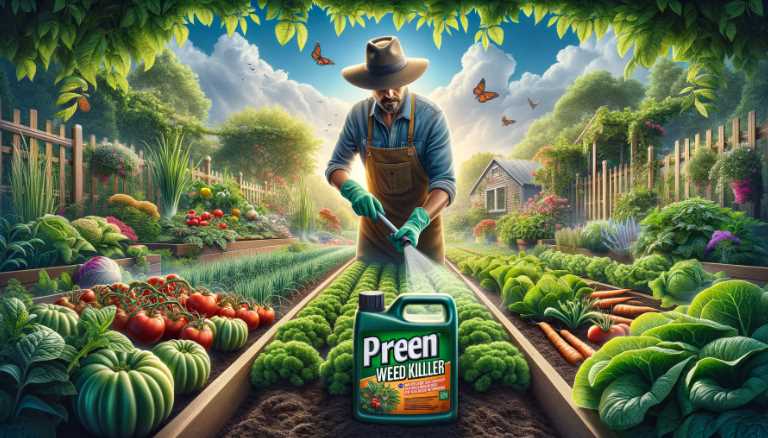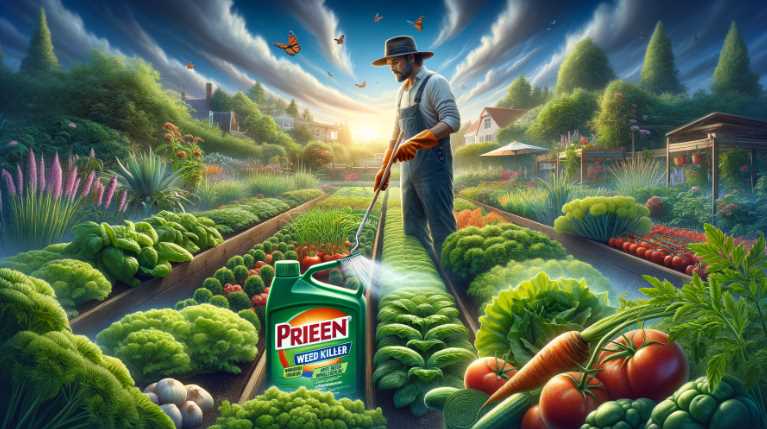Yes, Preen Weed Killer can be used in a vegetable garden, but caution is advised. While it is generally safe for many plants, including some vegetables, specific considerations must be considered to ensure optimal results and prevent potential harm.
Preen Weed Killer is popular for preventing weed growth in various settings, including vegetable gardens. However, it contains active ingredients, such as trifluralin and dithiopyr, which can impact plants differently. Here are key considerations:
- Compatibility: Some vegetables may be more sensitive to the active ingredients in Preen. It’s essential to check the compatibility of specific vegetables before application.
- Application Guidelines: Follow the recommended application guidelines provided on the product packaging. Applying the right amount at the right time is crucial for effectiveness and safety.
- Soil Impact: While Preen is generally safe, overuse can impact soil health. Monitoring the soil regularly helps maintain a balanced and fertile environment for vegetable growth.
| # | Preview | Product | Price | |
|---|---|---|---|---|
| 1 |

|
Preen Extended Control Weed Preventer - 4.93 lb. Bottle - Covers 805 sq. ft. |
$23.99 |
Buy on Amazon |
Last update on 2024-12-19 / Affiliate links / Images from Amazon Product Advertising API

To assist in decision-making, the following table provides a general guide to the compatibility of Preen Weed Killer with common vegetables in a garden:
| Vegetable | Preen Compatibility | Notes |
|---|---|---|
| Tomatoes | Yes | Follow recommended application guidelines. |
| Carrots | Use with Caution | Preen may affect root vegetables. Exercise caution. |
| Lettuce | Yes | Generally safe; follow proper application methods. |
Alternatives to Preen in Vegetable Gardens
Finding alternatives to Preen Weed Killer for weed control in vegetable gardens is crucial, especially for those seeking organic or non-chemical options. Here are effective alternatives to consider:
1. Mulching:
Mulching is a natural and organic method that involves covering the soil around plants with a layer of materials like straw, wood chips, or leaves. Mulch helps suppress weed growth by blocking sunlight and preventing weed seeds from germinating. It also retains soil moisture and improves overall soil health.
2. Hand Weeding:
Hand weeding is a manual and chemical-free method where gardeners remove weeds by hand. While it requires more labor, it is a precise and environmentally friendly way to control weeds. Regularly inspecting the garden and removing weeds as soon as they appear helps prevent weed competition with vegetables.
3. Organic Weed Killers:
Explore organic weed control products that are specifically formulated for vegetable gardens. These products often use natural ingredients like vinegar, citrus oils, or herb extracts to target and eliminate weeds without harming vegetables. Ensure that the chosen product is labeled as safe for use in vegetable gardens.
4. Corn Gluten Meal:
Corn gluten meal is an organic pre-emergent herbicide that inhibits the germination of weed seeds. It provides weed control without harming established plants, making it suitable for vegetable gardens. It also contains nitrogen, acting as a natural fertilizer for your vegetables.
5. Vinegar Solutions:
White vinegar can be a potent weed killer. Mix it with water and a small amount of dish soap to create a homemade herbicidal spray. This solution is effective against many common weeds and can be applied directly to unwanted vegetation.
6. Boiling Water:
Pouring boiling water directly onto weeds is a simple and chemical-free method to control them. This is best suited for areas where you want to eliminate weeds without affecting surrounding plants. Exercise caution to avoid burning yourself during the application.
When choosing an alternative to Preen, consider the specific needs of your vegetable garden, the types of weeds present, and your preference for organic or chemical-free solutions. Implementing a combination of these alternatives can provide effective and sustainable weed control while promoting a healthy environment for your vegetables to thrive.
Can I use Preen Weed Killer in my vegetable garden?
Using Preen Weed Killer in a vegetable garden requires careful consideration. The active ingredients in Preen, such as trifluralin and dithiopyr, can affect different plants differently. Before applying Preen in a vegetable garden, it’s crucial to understand the compatibility of the product with various vegetables and the potential impact on soil health.
| Vegetable | Preen Compatibility | Notes |
|---|---|---|
| Tomatoes | Yes | Follow recommended application guidelines. |
| Carrots | No | Preen may affect root vegetables. Exercise caution. |
| Lettuce | Yes | Safe for use; follow proper application methods. |
What are the active ingredients in Preen Weed Killer?
Preen Weed Killer contains active ingredients designed to prevent weed growth. These ingredients, trifluralin and dithiopyr, work by inhibiting the development of weed roots. Here’s a breakdown:
| Active Ingredient | Function |
|---|---|
| Trifluralin | Inhibits germination of weed seeds. |
| Dithiopyr | Prevents root development in weeds. |
How do I apply Preen Weed Killer?
Proper application of Preen Weed Killer is essential for effective weed control. Follow these steps:
| Application Step | Instructions |
|---|---|
| 1. Preparation | Clear the garden area of existing weeds and debris. |
| 2. Application | Sprinkle Preen evenly over the soil according to package instructions. |
| 3. Watering | Water the treated area to activate the Preen and settle it into the soil. |
Is Preen Weed Killer safe for all types of plants?
While Preen is generally safe for many plants, it may not be suitable for all. Some plants, especially certain vegetables, can be sensitive to the active ingredients. Here’s a general guide:
| Plant Type | Preen Compatibility | Notes |
|---|---|---|
| Flowers | Yes | Generally safe; follow recommended guidelines. |
| Vegetables | Varies | Check individual vegetable compatibility. |
| Shrubs | Yes | Safe for use; follow application guidelines. |
Are there any risks associated with using Preen Weed Killer?
While Preen is a widely used weed control product, there are potential risks to be aware of. Consider the following:
| Potential Risk | Precautions |
|---|---|
| Soil Impact | Avoid overuse; monitor soil health regularly. |
| Plant Sensitivity | Test on a small area before widespread application. |
| Environmental Impact | Follow guidelines to minimize environmental impact. |
Can I use Preen Weed Killer on my lawn?
Preen Weed Killer is primarily designed for use in flower beds and landscaping, not on lawns. The active ingredients may interfere with grass growth. It’s recommended to explore lawn-specific weed control products for optimal results.
What are alternatives to Preen Weed Killer in vegetable gardens?
If you prefer alternatives to Preen in your vegetable garden, consider these options:
| Alternative Method | Description |
|---|---|
| Mulching | Cover soil with organic mulch to suppress weed growth. |
| Hand Weeding | Remove weeds manually to avoid chemical exposure. |
| Organic Weed Killers | Explore vegetable-safe, organic weed control products. |
Recap
Alternatives to Preen Weed Killer for vegetable gardens include organic methods like mulching, hand weeding, and organic weed killers. Mulching obstructs weed growth and enhances soil health, while hand weeding offers a manual, eco-friendly approach. Organic weed killers, using natural ingredients, provide targeted weed control.
Corn gluten meal is also an organic pre-emergent herbicide, and vinegar solutions or boiling water offer chemical-free options. Choosing the right alternative depends on individual preferences, environmental considerations, and the specific needs of the vegetable garden, ensuring effective weed control without compromising the health of the crops.

